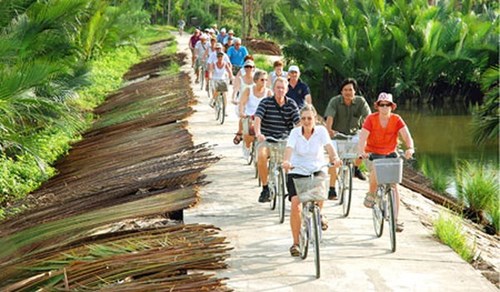In 2017, many agricultural products of Vietnam met strict import requirements to export to some international strict markets, such as the U.S., Japan and EU. Of particular note, Vietnam earned nearly US$ 3.2 billion from exporting fruits and vegetables in the first 11 months of this year, up by 43.1 percent. 2017 was also the first time that the country’s foreign-exchange reserves reached its highest level, at US$ 46.7 billion, while Vietnam’s public debt in 2017 was slightly lower than that of previous years.
    |
 |
|
Vietnam welcomed 13 million foreign visitors in 2017. (Photo for illustration: vov.vn) |
In addition, the VN Index, which is used to measure the country’s economic-financial development, reached 984 points at year end, the highest level in the last ten years. 2017 was also seen as a successful year for Vietnam’s tourism as the country for the first time welcomed around 13 million international visitors.
Last year, Vietnam recorded significant breakthroughs in the investment environment and social investment capital. It was shown in the World Economic Forum's 2017-2018 Global Competitiveness Report which ranked Vietnam 55th out of out of 137 countries, up five places from previous year and 20 places since 2013. According to the World Bank report, Vietnam’s business climate index moved up 14 places to rank 68th among world economies.
Thanks to the improvement in investment environment, many companies resumed their operations and many others newly registered their operation, bringing the total number of acting businesses to 153,300. Moreover, last year Vietnam attracted US$35.9 billion in foreign direct investment (FDI). This is clear and convincing evidence proving the increase in the attractiveness of Vietnam market in the world.
More particularly, Vietnam’s successful hosting of the APEC Year 2017 also affirmed the country’s position and stature and was also a golden chance for the country to attract more investment. On the sidelines of the APEC Economic Leaders’ Week 2017 in Da Nang City in November, Vietnamese businesses signed 121 deals, worth US$ 20 billion in total, with international leading groups. More importantly, 11 remaining member countries of Trans-Pacific Partnership reached consensus on proceeding with the trade pact without the United States under a new name, the Comprehensive and Progressive Agreement for Trans-Pacific Partnership (CPTPP).
Vietnam’s socio-cultural, environmental, defense, security and foreign relations fields also saw positive changes. The increase in retail turnover proved the expansion of domestic market and was a driving force for the country’s economic growth in the coming time.
Furthermore, Vietnam’s remarkable achievements in internal and external affairs last year affirmed its wise and effective policies as well as its intelligence in carrying out the renewal process and in integrating into the world.
Based on the above-mentioned noteworthy achievements, Vietnam has set a target of an economic growth of 6.5 percent this year. Accordingly, the country will focus on stabilizing microeconomics, making drastic and practical changes, restructuring the economy, raising the productivity, quality, efficiency and competitiveness, encouraging renovation, fostering administrative reform and promoting the fight against corruption, wastefulness and group interests.
Translated by Tran Hoai